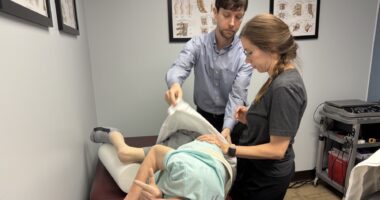Living With SMA
Overview
The loss of motor neurons leads to weakness and atrophy of the muscles most used during daily activities, like crawling, walking, sitting up, or controlling head movements. Muscles used for breathing and swallowing can also be affected in spinal muscular atrophy (SMA).
As a result, living with SMA can affect the life of patients and their families in many different ways, from nutrition to travel, and they may need specialized equipment to support them along the way.
Assistive Devices
SMA patients often need specialized equipment to help with breathing, coughing, and swallowing, to support them in daily activities and to increase their mobility. Equipment needs depend on the severity of the condition. It can range from simple walking aids, such as braces and grab bars, to electric wheelchairs, bath chairs, breathing and feeding equipment, and car beds for traveling.
Nutritional Support
Children with SMA often experience substantial gastrointestinal and nutritional issues. Impaired feeding correlates with failure to thrive and various co-morbidities. Moreover, recent research has suggested that people with SMA have higher rates of metabolic abnormalities, including metabolic acidosis, hyperlipidemia, hyper/hypoglycemia, and hyperleptinemia.
Palliative Care
Palliative care is specialized medical care for people with serious diseases like SMA, focused on providing relief from the symptoms and stress of the disease. The word “palliative” means soothing, calming and pain relieving. Whether used in SMA or in other disease management, palliative care is about comfort. Its goal is to improve quality of life for both the patient and the family.
Respiratory Care
Weakness in the respiratory system is a common and serious complication of spinal muscular atrophy (SMA), and pulmonary disease is the primary cause of morbidity and mortality in SMA type 1 and SMA type 2 patients. Respiratory care is imperative for patients to maintain their quality of life. This includes airway clearance, intubation, oxygenation, perioperative considerations, and more.
Co-morbid Conditions
SMA has co-morbidities relating to various aspects of the disease itself, from sleeping disorders to cardiac disease. Some relate to specific types of SMA, while others can occur due to the severity of symptoms. Increasing evidence suggests that the disease also affects bones, the liver, heart, and pancreas, as well as the vascular and immune systems.
Feeding Issues
People with SMA may experience a number of gastrointestinal issues, as well as swallowing and/or chewing difficulties in the more severe types, making getting adequate nutrition a challenge.


